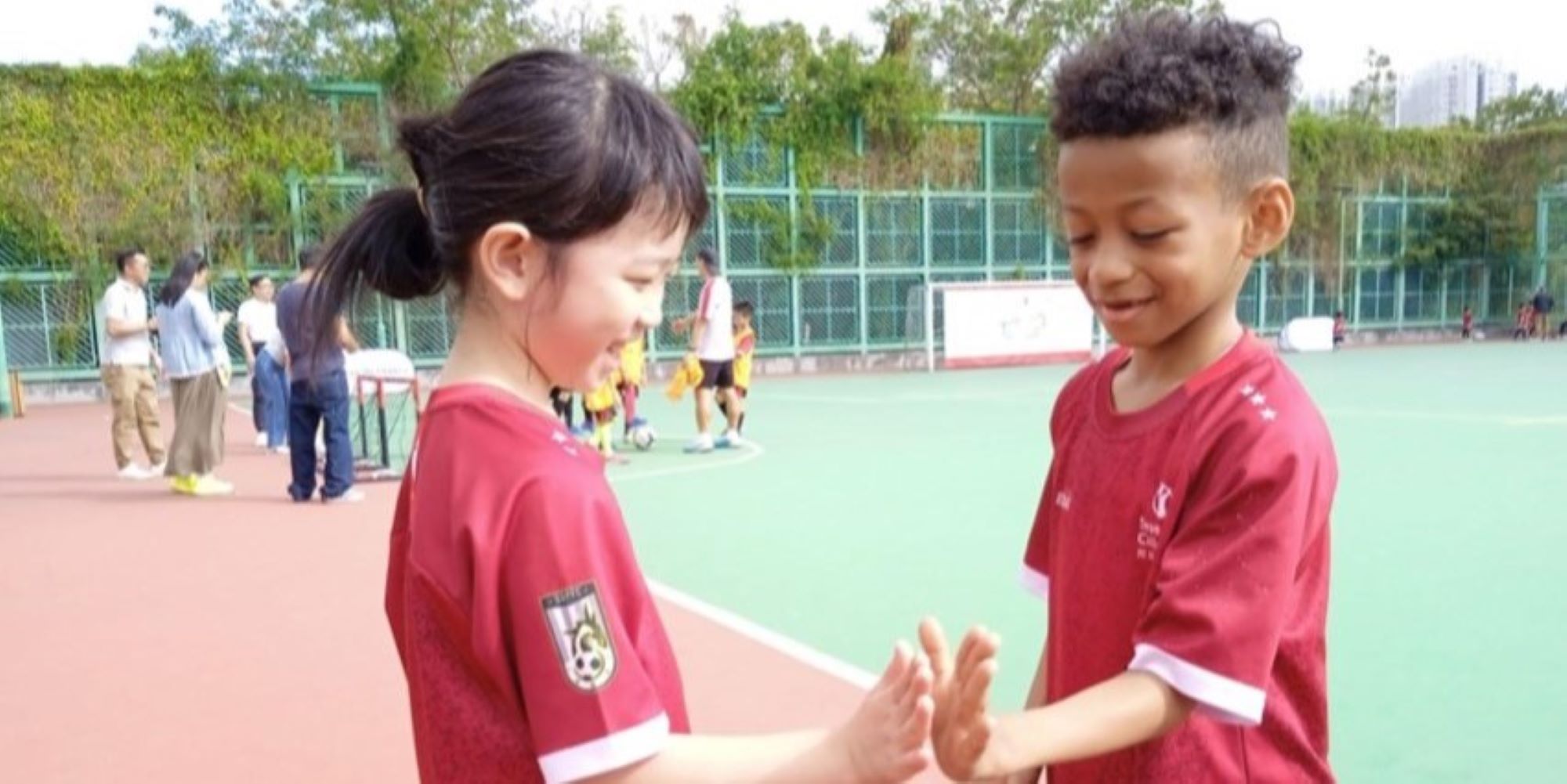
Soccer is a universal language. Shared interests can draw people together, regardless of their race, age, or gender; people bound over activities they enjoy. Through soccer training, Chi Hoi, a Chinese-African six year—old, has made friends, learned about interpersonal relationships and communication, cooperation and problem-solving on the field.
Chi Hoi, along with his teammates and coaches, is having a great time at training. Currently a primary 1 student, Chi Hoi, has a mother from Hong Kong and a father from Nigeria. He has a playful but shy personality and is always curious to explore new things. His mother Laura mentioned that although Chi Hoi was born and raised in Hong Kong and speaks fluent Cantonese, the three-year pandemic has limited his interactions with other children and hindered his social skills. As a result, he still feels a bit hesitant around his peers. He wants to play with other children, but he doesn’t dare to take the initiative, especially when he sees older children, Chi Hoi tends to keep a certain distance.
Learning teamwork and responsibility through soccer
Laura learnt about Save the Children Hong Kong’s “Play to Thrive” programme from other parents and enrolled Chi Hoi in the programme, hoping that he would engage in more group activities and spend more time with other children so that he could improve his communication skills. She expressed, “I want him (Chi Hoi) to give everything a try, to broaden his horizons, learn about group life, and build friendships of his own.”
Although Chi Hoi has only been part of the programme for two months, his mother has already noticed significant progress. Laura noted, “Chi Hoi used to struggle with following instructions, but seeing other children adhere to the rules and doing as the coach says has inspired him to learn.” As a team sport, soccer has helped Chi Hoi understand the importance of following the coach’s guidance and collaborating with his teammates.
Laura happily shared that during class, Chi Hoi learnt that each player has a specific position and role on the pitch, such as goalkeepers who try their best to stop the opposing team from scoring. This has helped him comprehend that each and every player has a responsibility. Besides, Chi Hoi also noticed that communication is key. He practiced expressing himself and listening carefully to his teammates’ demands. “When the kids are enjoying something, it is obvious to tell even if they can’t express themselves verbally, their body language shows it all!”
Chi Hoi has not explicitly stated whether he enjoys his soccer lessons, but his actions speak volumes. He was very active and involved in soccer lessons and was delighted when he put on the free jerseys and shoes provided by the organization because it meant that he could attend the soccer lessons and play with his teammates.
After every soccer lesson, Chi Hoi reminds his mom to wash his jersey for the next session. He would share details about his soccer lessons with his drawing class tutor, and points at his jersey with pride and confidence. When asked about his best friend among his teammates, Chi Hoi named his friends and pointed out his soccer buddies on the field without hesitation.
“The world isn’t just about you, acceptance is something you must learn.”
Laura said she hopes her son could learn how to interact with different people through soccer training. “From time to time, I noticed that some of the more competitive and aggressive teams have conflicts over possession of the ball on the pitch. With the coaches mediating these situations, the kids learn that even if things don’t go their way, acceptance is crucial. This is an essential skill for teamwork and for developing the social skills children need as they grow.” She is also excited to see that Chi Hoi has made new friends in class, and believes that the enriching and instructive experiences on the soccer field will help him develop a positive attitude towards others, at the same time, equip him to handle life challenges more maturely.”
“Play to Thrive” Programme Integrates Social-Emotional Skills Learning into Soccer for Children to Learn While Playing
Save the Children Hong Kong is now in the second phase of its “Play to Thrive” programme, designed to promote children’s physical, mental, and social well-being by integrating social and emotional skills into soccer training. This programme is open to children from all backgrounds. Upon completion of the programme, participants will be invited to join our football team “童毅社” as junior members of Save the Children Hong Kong and take part in other soccer training and activity groups.
Laura expressed her gratitude for the programme, highlighting its role in providing a platform for children to learn from one another in an inclusive atmosphere. She added, “children need to experience various settings to grow. Soccer is a great way to address important life lessons so that children can naturally absorb knowledge while having fun.”
